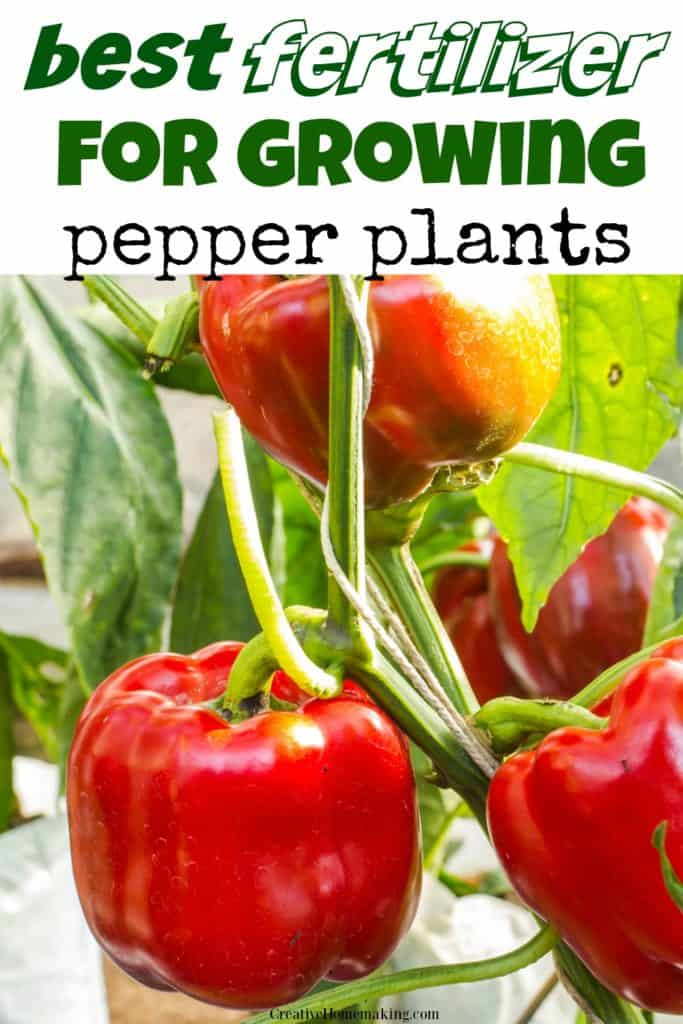Discover the Best Fertilizers for Peppers: Top Picks for Optimum Development
Discover the Best Fertilizers for Peppers: Top Picks for Optimum Development
Blog Article
Organic Vs. Synthetic Fertilizers: Which Is Best for Nurturing Healthy And Balanced Pepper Plants?
In the world of nurturing healthy pepper plants, the selection in between synthetic and natural fertilizers stands as an essential decision with far-ranging ramifications. While both choices goal to provide important nutrients to sustain plant growth, the nuances of their influence on the soil, plant health, and the setting spark a debate that echoes throughout the gardening neighborhood. Understanding the distinct advantages and possible mistakes of each plant food kind is critical for pepper farmers seeking to enhance their yields while keeping a lasting and eco-conscious method.
Benefits of Organic Fertilizers
Organic plant foods supply a lasting and environmentally-friendly strategy to beneficial pepper plants, offering essential nutrients without using artificial chemicals. These natural fertilizers are originated from organic sources such as garden compost, manure, bone dish, and seaweed, advertising dirt health and wellness and biodiversity. Unlike synthetic plant foods, organic options launch nutrients gradually, making certain a well balanced and steady supply for pepper plants to prosper.
One considerable advantage of organic fertilizers is their ability to enhance soil framework and water retention. By improving dirt wellness, organic plant foods promote valuable microbial task, which assists in nutrient uptake by pepper plants. Additionally, organic fertilizers minimize the threat of chemical run-off, protecting water resources from air pollution and protecting the environment.
Moreover, organic fertilizers add to lasting dirt fertility by advertising the growth of beneficial dirt microorganisms. These organisms aid break down raw material, launching nutrients in a type that is quickly accessible to pepper plants. best fertilizers for peppers. By cultivating a healthy and balanced dirt environment, natural plant foods support lasting pepper cultivation methods that profit both plants and the atmosphere
Drawbacks of Artificial Fertilizers
Synthetic fertilizers, in comparison to their natural equivalents, position various drawbacks when utilized to nurture pepper plants, influencing both plant health and wellness and environmental sustainability. One major drawback of artificial plant foods is their tendency to leach nutrients from the soil rapidly. This quick leaching can result in vitamins and mineral imbalances in the soil, causing plants to endure from toxicities or deficiencies. In addition, synthetic plant foods can hurt advantageous soil microorganisms, such as earthworms and useful germs, interrupting the soil ecological community's balance.
Additionally, the overuse of synthetic fertilizers can add to water pollution. Excess plant foods not absorbed by plants can get rid of right into water bodies, causing eutrophication, where algae blossoms diminish oxygen levels in look at this site the water, hurting water life. Synthetic plant foods are typically acquired from non-renewable sources, such as fossil gas, contributing to carbon emissions and ecological degradation during their manufacturing.
Nutrient Absorption Comparison
When comparing artificial and organic plant foods in terms of nutrient absorption, organic plant foods have the advantage of giving a more well balanced and slow-release resource of nutrients. Organic fertilizers have a variety of macro and trace elements that are not just valuable for the plants yet likewise advertise healthy soil microbial activity, which assists in nutrient uptake.
Furthermore, organic plant foods enhance soil structure and water retention capacity, permitting pepper plants to gain access to nutrients more successfully. This better dirt high quality helps with origin growth, making it possible for much better nutrient absorption. Artificial plant foods, although originally boosting plant growth as a result of their high nutrient concentrations, might prevent lasting nutrient absorption by degrading dirt health and wellness with time.
Environmental Effect Considerations
:strip_icc()/BHG-Growing-Peppers-Indoors-EzgaEnB7KML9Ym_plkvuxK-9398f1341d86483083862533ae7622db.jpg)
On the other hand, artificial fertilizers, although commonly even more focused and quickly available to plants, can have detrimental impacts on the setting otherwise applied appropriately (best fertilizers for peppers). Their site here production needs high energy inputs, causing greenhouse gas discharges and adding to climate change. The overflow of excess artificial plant foods can infect water resources, leading to eutrophication and damaging aquatic ecological communities.
Best Plant Food Practices for Peppers
To achieve this, it is essential to follow best fertilizer methods customized to the certain needs of pepper plants. One vital technique is to do a dirt test before applying any type of plant foods.
Another vital practice is to fertilize pepper plants at the correct time. Typically, peppers profit from obtaining fertilizer at growing and after that once again when they begin to blossom. Over-fertilizing can bring about nutrition inequalities and harm the plants, so it is vital to adhere to recommended application prices.
Furthermore, picking a balanced fertilizer with an NPK proportion that suits pepper plants' demands is fundamental. Eventually, integrating natural and synthetic fertilizers judiciously can aid nurture healthy and balanced pepper plants while minimizing ecological effect.
Conclusion

Organic plant foods use a sustainable and environmentally-friendly strategy to nourishing pepper plants, supplying crucial nutrients without the usage of artificial chemicals. Unlike synthetic fertilizers, organic alternatives launch nutrients slowly, making certain a balanced and constant supply for pepper plants to prosper.
Artificial plant foods, in comparison to their natural counterparts, position numerous disadvantages when utilized to nurture pepper plants, impacting both plant health and wellness and ecological sustainability. When comparing artificial and natural fertilizers in terms of nutrient absorption, browse around this web-site organic plant foods have the benefit of offering a much more well balanced and slow-release resource of nutrients.Moreover, natural plant foods boost dirt framework and water retention capability, enabling pepper plants to accessibility nutrients extra successfully.
Report this page